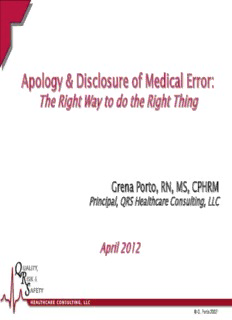
Apology & Disclosure of Medical Error: - South Carolina Hospital PDF
Preview Apology & Disclosure of Medical Error: - South Carolina Hospital
Apology & Disclosure of Medical Error: The Right Way to do the Right Thing Grena Porto, RN, MS, CPHRM Principal, QRS Healthcare Consulting, LLC April 2012 © G. Porto 2007 1 Key Points There are strong moral and ethical arguments in favor of a duty to disclose medical error. Multiple studies have shown that patients expect disclosure of errors along with apology, and assurances that errors won’t recur. Research indicates that disclosure and apology can have favorable effects on medical malpractice litigation and costs. Sincerity, careful planning and skillful execution are essential. © G. Porto 2007 2 Disclosure of Error: A Brief History Momentum built following IOM report. Professional societies outlined ethical and moral duties – AMA, ASIM, others. Published evidence of positive effects began accumulating. Positive effects demonstrated for both patients and providers. Yet, resistance remains. © G. Porto 2007 3 Providers Fears About Disclosure Disclosure will create more suffering for the patient. Disclosure will damage the relationship with the patient. Disclosure will cause embarrassment and professional isolation. Disclosure will lead to litigation. © G. Porto 2007 4 Clear Downside Risks for Failure to Disclose Legal Financial Ethical Emotional © G. Porto 2007 5 The Disclosure/Liability Cycle Event occurs Provider’s Patient aware that concludes fears something has were well- happened, founded expects explanation Patient sues Provider does provider not disclose fearing increased liability Patient feels angry and betrayed © G. Porto 2007 6 © G. Porto 2007 7 Beyond Disclosure to Apology Increasing interest in “medical apology laws”: As of 2009, 36 states and the District of Columbia have statutes or rules of evidence that prevent the use of apologies as evidence of fault in medical malpractice cases. 25 of these laws have been enacted since 2005. Stated purpose is to reduce the incidence of claims resulting from unanticipated outcomes. © G. Porto 2007 8 The South Carolina Apology Law The “Unanticipated Medical Outcome Reconciliation Act” was passed in 2006. Requires apology to be made in “a designated meeting to discuss the unanticipated outcome.” © G. Porto 2007 9 Why Apologize? Apologies provide important benefits: subtract insult from injury help to restore trust help both provider and patient to recover reduce animosity, antagonistic behavior help speed settlements – but only if they include acceptance of responsibility © G. Porto 2007 10
Description: